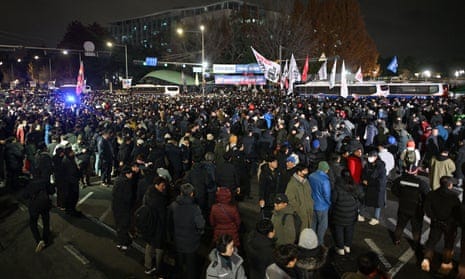What is happening in "democratic" South Korea?
A coup d'état? The corrupt President invoked martial law, without consulting the cabinet, but the defying Parliament declared it invalid.

South Korea, often praised as one of Asia's most advanced democracies, is experiencing one of the darkest moments in its recent history. What until recently was considered a model of democratic government has turned into an authoritarian nightmare, with President Yoon Suk Yeol seemingly embracing methods typical of dictatorial regimes.
The pretext? Alleged threats to national stability and accusations of collusion with North Korea.
The reality? A desperate attempt to retain power in the face of corruption scandals and a parliament ready to remove him.
The declaration of martial law? A coup d'état in disguise.
Tonight, President Yoon has shocked the world by declaring martial law (see for instance this New York Times article), justifying it as the only way to “protect democracy” against an opposition he accused of being infiltrated by pro-North Korean forces. However, the timing and manner of this decision leave little doubt as to the President's true intentions. The opposition, the Democratic Party, which holds a majority in Parliament, had recently announced its intention to investigate corruption scandals involving both the president and his wife (see this Korea Times article, for instance), a fact that most Western mainstream media omit in their narrative. Yoon's response was swift and brutal: to paralyse all forms of dissent by imposing a state of emergency. The measures taken are draconian (source: The Guardian):
Ban on political activities and demonstrations.
Total censorship of media and publications.
Arrests without warrant for anyone violating the Martial Law Decree.
Militarisation of the streets, with armoured vehicles and troops patrolling the capital, Seoul.

The impact of martial law was immediate and devastating:
The South Korean won and stock exchange plummeted (sources: The Guardian and Yahoo! Finance), signalling panic in international markets.
Mass protests began in Seoul, with thousands of citizens demanding the resignation and arrest of the president (see photo above).
Opposition in turmoil: members of parliament attempted to climb over barriers erected by the military to stop the passing of martial law (see video below), but many were arrested on the spot.
Institutional trust shattered: the police chief and some senior military officers refused to follow orders, creating rifts in the security forces.
The Mask of “Democracy” has fallen. The paradox of this situation is obvious: Yoon Suk Yeol justified the repression as a means to “rebuild a free and democratic society”, but his actions speak volumes. By censoring the media, banning political activities and arresting opponents, Yoon has shown that his priorities are not about democracy, but about consolidating his personal power. The parallels with other crises, such as the one in Ukraine, are inevitable. But while Zelensky can invoke the context of war to justify certain decisions, Yoon has no alibi. The real motive seems to be the fear of facing investigations into alleged billions embezzled from the country, a fear so great that it pushed him to undermine democracy itself in order to save himself.
Despite the climate of repression, South Korea did not bend. The Parliament, in defiance of the military, voted to abolish martial law and tabled impeachment proposals against Yoon. Korean citizens with great courage continue to take to the streets, showing that the democratic spirit is still alive.
Nice these “democratic” presidents, aren't they (see also Emmanuel Macron in France and Salome Zourabichvili in Georgia)? “Democrats” only because they serve the Outlaw US Empire, which - by the way - reacted to the news coming from South Korea just by saying that it was “closely monitoring the situation” (source: The Guardian). If this had happened in a country hostile to the evil US empire, we would have heard a different narrative by now.
Democracy… pfft, the Republic of Korea has lived under military dictatorships since its foundation and until 1987, thus for at least half of its entire existence!
P.S.: Just before publishing this article, The Guardian has reported that the South Korean President Yoon Suk Yeol will lift the martial law after convening his cabinet:

In any case, I expect that he will be impeached and arrested soon!
UPDATE: The Cabinet has agreed to lift the martial law, as reported by The Guardian, citing the South Korean Yonhap news agency.




Anytime the US says it is "“closely monitoring the situation”, it means the CIA is working to destabilize it.
The illusion of freedom will continue as long as it's profitable to continue the illusion.
At the point where the illusion becomes too expensive to maintain, they will just take down the scenery, they will pull back the curtains, they will move the tables and chairs out of the way and you will see the brick wall at the back of the theater.
Frank Zappa